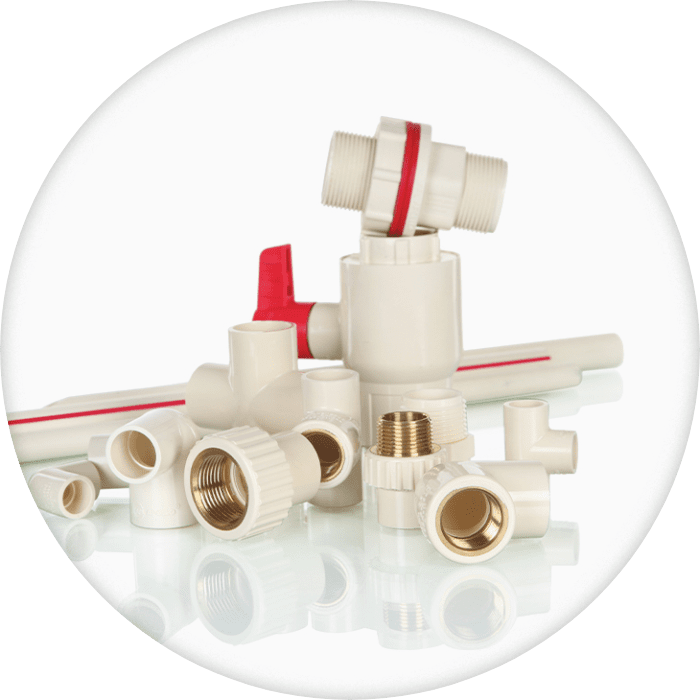What are CPVC Pipes?
CPVC (Chlorinated Polyvinyl Chloride) pipes are a popular choice for residential plumbing systems. CPVC pipes are manufactured using a process called extrusion. These pipes are widely used for residential plumbing systems due to their numerous advantages and applications.
Key Features Of CPVC Pipes
1. Material
CPVC pipes are made from a thermoplastic material that is a modified version of PVC. When chlorine is added to PVC, it makes CPVC more heat-resistant and suitable for hot water applications.
2. Durability
CPVC pipes are highly durable and have the strength to withstand high temperatures and pressure.
3. Resistance to Chemicals and Heat
CPVC pipes have excellent resistance to many chemicals that are commonly found in residential plumbing systems. Such chemicals may be acids, alkalis, and salts. That is why they are more suitable for a wide range of applications. CPVC pipes are specifically designed for hot water applications. They can withstand temperatures up to 200°F without getting deformed.
4. Easy to Install
CPVC pipes are lightweight and it is easy to install them. They are available in various lengths and sizes and can be cut and connected using solvent cement.
5. Cost-effective
CPVC pipes are usually more affordable as compared to other piping materials. As they are easy to install and thus reduce overall labor costs.
Key Consideration For Homeowners For The Use Of CPVC Pipes
Some key considerations for homeowners regarding the use of CPVC pipes for residential plumbing are mentioned below:
1. Safe
CPVC pipes are safe for various residential plumbing applications such as cooking, drinking, and bathing. These pipes are extensively time-tested and approved for use in potable water systems.
2. Compatible
When we choose CPVC pipes, there is a need to ensure that they are compatible with the other plumbing components in our system including fittings, valves, and connectors.
3. Water Quality
CPVC pipes are known to have low levels of leaching or leakage and do not affect the taste of the water. However, it is better to have our water quality tested periodically to ensure the integrity of our plumbing system.
4. Minimal Maintenance
CPVC pipes need minimal maintenance compared to other materials. Although, they do not corrode easily, but we should ensure regular inspections and maintenance of the plumbing system as it will help identify any issues early and ensure its longevity.
5. Expansion and Contraction
CPVC pipes have a relatively low coefficient of expansion, meaning they expand and contract less with temperature changes as compared to metal pipes. It is important to allow for expansion gaps and use expansion joints when installing CPVC pipes to prevent stress and potential leaks.
6. UV Exposure
CPVC pipes are sensitive to UV radiation and they should avoid being exposed to direct sunlight. If installing CPVC pipes outdoors or in areas with sunlight exposure, they should be protected with insulation.
7. Proper Design
Proper design of our plumbing system is crucial for efficient and effective water flow in our residential or commercial area. An expert plumber can help with the layout, sizing, and configuration of our CPVC pipe system ensuring optimal performance.
8. Long-lasting
CPVC pipes come with warranties from manufacturers. We must review the warranty terms and conditions to understand the coverage and duration. It is proven and time-tested that CPVC pipes have a long lifespan when installed and maintained correctly.
Each home and plumbing system has its uniqueness and requirements thus, it is essential to consider our specific requirements, and local building codes, and consult with a plumbing expert to make informed decisions about using CPVC pipes in our residential plumbing system.
APL Apollo CPVC Pipes: Perfect Choice For Residential Plumbing
 APL Apollo CPVC pipes and fittings are the ultimate solution for all plumbing needs. These plumbing pipes go through a rigorous test and are manufactured using the state of the art technology. These CPVC Pipes and fittings can be used for an array of applications, including Hot and cold water distribution in residential, commercial, and industrial spaces carrying potable water and edible fluids.
APL Apollo CPVC pipes and fittings are the ultimate solution for all plumbing needs. These plumbing pipes go through a rigorous test and are manufactured using the state of the art technology. These CPVC Pipes and fittings can be used for an array of applications, including Hot and cold water distribution in residential, commercial, and industrial spaces carrying potable water and edible fluids.
APL Apollo’s CPVC piping systems are unaffected by corrosion and harmful UV rays. These pipes are easy to install as they are light in weight. These CPVC plumbing fittings have high-impact resistance and ensure superior performance in locations with specific temperature ranges. Also, these pipes have self-extinguishing properties making them resistant to combustion. These CPVC plumbing systems are leak-proof, UV resistant, have low thermal expansion, corrosion-free, and are bacteria-free. Hence APL Apollo CPVC pipes and fittings are the perfect choice for residential plumbing applications.



